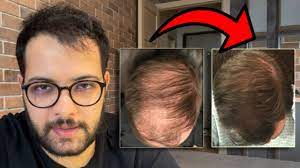Introduction:
Hair loss is a deeply personal struggle affecting millions worldwide, transcending age, gender, and cultural boundaries. For those grappling with this issue, finding an effective solution can be an arduous journey. The causes of hair loss are diverse, ranging from genetic predisposition and hormonal imbalances to stress, poor nutrition, and underlying medical conditions. Understanding these multifaceted triggers is crucial in developing tailored treatments that address the root causes, offering individuals a more targeted and effective path towards hair restoration.
In recent times, Pyrilutamide, a non-FDA approved compound, has emerged as a beacon of hope in the fight against hair loss. Pyrilutamide (KX-826) is a topical androgen receptor (AR) antagonist, being developed as a potential topical treatment for androgenetic alopecia.
This innovative approach has captured the attention of both scientists and individuals seeking viable treatments, shedding light on the potential of Pyrilutamide in restoring not just hair, but confidence and self-esteem.
Understanding the Complexity of Hair Loss:
Hair loss, often driven by factors such as genetics, hormonal imbalances, and environmental elements, disrupts the natural hair growth cycle. The underlying causes, including the influence of dihydrotestosterone (DHT), necessitate a comprehensive solution. Pyrilutamide’s unique mechanism of action in addressing these complexities offers a glimmer of hope to those yearning for a fuller head of hair.
Mechanisms of Action:
Pyrilutamide, a groundbreaking compound, operates as a potent androgen receptor antagonist. By inhibiting DHT binding to androgen receptors in hair follicles, Pyrilutamide prevents the detrimental effects of DHT, a key contributor to hair loss. Additionally, Pyrilutamide regulates sebum production, a vital factor influencing hair health. By controlling scalp oiliness, it creates an optimal environment for robust hair growth, making it a dual-action marvel in the realm of hair loss treatments.
Moreover, Pyrilutamide’s role as an androgen receptor antagonist not only prevents hair follicle damage caused by DHT but also promotes a healthier hair growth cycle. By modulating sebum production, Pyrilutamide ensures that hair follicles receive adequate nourishment and oxygen, promoting an environment conducive to the development of thicker, stronger hair strands. This intricate balance of actions underscores Pyrilutamide’s potential to revitalize hair and restore confidence to those grappling with the challenges of hair loss.
Indications and Uses:
Pyrilutamide finds its primary application in the treatment of androgenetic alopecia, a condition affecting both men and women. Dermatologists prescribe Pyrilutamide for localized application on the scalp, targeting specific areas of hair loss. Its potential to halt hair loss progression, stimulate regrowth, and enhance existing hair thickness positions it as a promising option for those seeking effective and holistic hair loss remedies.
Furthermore, Pyrilutamide’s efficacy extends beyond androgenetic alopecia, showing promise in addressing hair loss caused by various factors, providing a versatile solution for individuals with diverse underlying conditions. Its ability to improve overall hair quality, coupled with its targeted approach, reinforces Pyrilutamide’s standing as a transformative and comprehensive solution in the realm of hair restoration therapies.
Contraindications and Precautions:
While Pyrilutamide offers promising results, it is imperative to consider contraindications and precautions before use. Individuals with known hypersensitivity to Pyrilutamide should refrain from its application. Pregnant or breastfeeding women must consult healthcare professionals to ensure the safety of both the mother and child. Adhering to prescribed dosages and application guidelines is crucial in minimizing the risk of adverse effects. Although rare, potential side effects may include:
- Mild itching
- Dry skin
- Mild redness and scalp irritation
- Mild contact dermatitis
These symptoms typically resolve with adjustments or discontinuation of use.
Safety Profile:
Pyrilutamide boasts a favorable safety profile, primarily due to its topical application, resulting in minimal systemic absorption. Clinical studies have demonstrated encouraging results, with few reported side effects. However, individual responses may vary, underscoring the importance of personalized guidance from healthcare providers. Regular monitoring and consultation with healthcare professionals ensure a safe and effective experience for individuals undergoing Pyrilutamide treatment.
Conclusion:
In the vast landscape of hair loss treatments, Pyrilutamide emerges as a promising non-FDA approved solution, offering a multi-faceted approach to combat hair thinning and loss. By addressing the root causes and providing targeted therapy, Pyrilutamide stands as a testament to scientific progress and innovation in dermatology. It is essential, however, to approach any treatment cautiously, seeking guidance from healthcare professionals to tailor the treatment plan to individual needs.
As research continues to unfold and technology advances, Pyrilutamide represents a glimmer of hope for those on the quest to regain their confidence and embrace a fuller, healthier mane. While the journey may be challenging, the potential benefits of Pyrilutamide pave the way for a future where hair loss is not just a problem, but a conquerable obstacle, fostering renewed self-assurance and a positive self-image.









